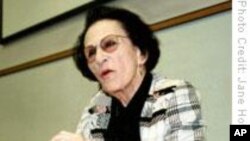To Maxine Greene, teaching isn't just a job, it's a calling. Greene is an emeritus professor at Teachers College of Columbia University in New York City. She has taught philosophy and education there since 1965. Though now in her 90s, she continues to teach and her classrooms are packed every semester.
Greene teaches people to think for themselves
Most educators impose too many of their own ideas, Greene said. "I think teaching should be a way of helping people find themselves and find out what they believe, and [to] question. I'm a believer in the unanswerable questions, [the] really hard ones."
Greene is well respected in global academic circles and has written scores of books and articles, yet she remains a humble learner who is still curious.
"Most people live in little locked rooms and they never look out at what's possible," she explained. By contrast, she advocates a way of thinking that leads not to certainty, but to possibility.
Greene stresses the importance of cultivating a healthy imagination and creative thinking about what should be – what could be – or how things might be.
A special approach to teach the teachers
Some of Greene's views are influenced by high-minded modern philosophies including existentialism. But she is also grounded in the down-to-earth realities of New York City's schools, where she inspired the creation of the High School for Arts, Imagination and Inquiry in 2005.
And, since 1976, Greene has been Philosopher-in-Residence at the Lincoln Center Institute for Arts in Education. The center offers teachers in-depth exposure to the visual and performing arts, through workshops taught by artists themselves.
For example, in a dance workshop, teachers and other attendees do not learn to be dancers. Instead, they learn to teach the medium of movement to children. Greene said she enjoys watching artists teach. "They try to translate this mysterious creative thing that they have into something other people can understand. Not to become what they are, but to keep it alive. It's quite wonderful," she said.
Listening to students and valuing their ideas
Perhaps the best thing about LCI's workshops is the dialogue they spark among teachers. Those who follow Greene's approach listen to their students and exchange ideas with them. This stands in sharp contrast to some standardized teaching methods. "Much of education tries to factor out those understandings – prior history, prior knowledge a sense of history, a sense of culture, a sense of self, and sense of learning style," said Lincoln Institute director Scott Noppe-Brandon.
Noppe-Brandon believes that honoring student perspectives and considering them to be of educational value, is one facet of Greene's humanistic approach to teaching and learning. "She takes great care to make sure that people who are engaged in the process are empowered not only to listen to her, but understand it and employ it in their own sense of their own life," Noppe-Brandon said.
The learning communities that Greene has created could lead to the re-imagination of society. In books such as "The Dialectic of Freedom," and "Landscapes of Learning," Greene stresses the importance of empathy in education, in art and in life.
Maxine Greene's unique stye has a big impact on people's lives
Greene says that when children or adults engage with a work of art, they gain an understanding of themselves, and that can lead to understanding others, says Carole Saltz, director of Teachers College Press, and Greene's editor since 1984. "You can't look at somebody you now understand and push them away as 'the other.' And when you do that, it creates the capacity to see the world as if it were otherwise," Saltz said.
Teacher Mary Bullock first met Maxine Greene in 1983 in suburban Virginia. Greene had just flown in from New York dressed in a turban with a cigarette-holder in hand, to teach a class on arts education. Bullock noted that even the most jaded public school teachers are impressed by Greene's unconventional ideas , "Maxine comes along and she talks about 'doing the decent thing because you ought to,'" she said.
For Bullock and her colleagues, Greene's visit was transformative. "You'll never meet anyone who has met Maxine Greene who doesn't say 'that woman changed my life,'" she added.
However, Maxine Greene can be an enigma, even to herself. At the close of a recent biographical documentary film, she is outside her Manhattan apartment building, stating 'I am what I am not yet.'
For many of those whom Maxine Greene has influenced or mentored, she remains a living testament to the power of possibility.




